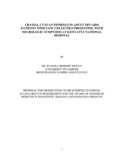Cranial Ct Scan findings in adult HIV/AIDS patients with low CD4 Levels presenting with neurologic symptoms at Kenyatta National Hospital

View/
Date
2017Author
Kunjira, Herbert M
Type
ThesisLanguage
enMetadata
Show full item recordAbstract
BACKGROUND: Neurological manifestations of HIV/AIDS (Neuro-AIDS) are variable
and can result from inflammatory conditions, opportunistic infections, neoplasms,
neurodegenerative conditions among others. Neuroimaging of HIV/AIDS patients is central in
the diagnostic workup of patients who present with neurological symptoms. Cranial CT scan
is fast, affordable and readily available locally making it a first line imaging tool in the
diagnosis of cranial complications of HIV/AIDS. It is also a reliable imaging modality in
follow up of patients on treatment for HIV related central nervous diseases.
PURPOSE: To determine cranial CT scan findings in HIV/AIDS patients presenting with
neurologic symptoms and a low CD4 count in an African population.
Materials and methods
The study was prospectively conducted within the adult medical wards in Kenyatta National
Hospital (KNH) over a period of nine months from May 2016 to January 2017. Patients with
HIV/AIDS presenting with neurological symptoms at Kenyatta National Hospaital were
prospectively recruited into the study. After initial assessment these patients underwent a
cranial CT head and CD4 level assessment. CD4 levels and predominant neurological
symptom were documented and information on whether or not the patients were on HAART
obtained. Data was collected from patients using questionnaires containing demographic,
clinical and imaging information. Data entry and analysis was done using SPSS for windows
version 21.0 (Chicago, Illinois). During analysis characteristics of participants was
summarized using descriptive statistics including means and standard deviations for
continuous variables and frequencies for categorical variables. Chi square test was used to
determine association between CT scan findings and CD4 levels.
RESULTS
Of the 94 patients presenting with low CD4 count 69% had abnormal CT findings and 31%
had normal findings. The commonest abnormal finding was cerebral mass lesions seen in 16
[17%] of CT scans, followed by brain atrophy occurring in 15 [16%] CT scans.
Other abnormal findings included brain edema 9 [9.6%], infarcts 8 [8.5%], increased
meningeal enhancement 7 [7.3%] and hydrocephalus 5 [5.3%]. Intraparenchymal cerebral
hemorrhage and other abnormalities occurred in 4 [6%] cranial CT scans.
Patients who had a higher CD4 count (over 200cells/microL) had predominant brain infarcts
8 [22.9%], brain atrophy 4 [11.4%] and mass lesions 4 [11.4%]. Ten [28.6%] in this group
had normal CT scan findings.
The predominant findings in patients with low CD4 and on HAART was brain atrophy 13
[20%], cerebral mass lesion 11[16.9%], brain infarct 7 [10.8%] and brain edema 7 [10.8%].
There was no significant difference in abnormal CT scan findings in patients with low CD4
count on HAART and those with low CD4 count not on HAART.
Majority of HIV/AIDS patients [66.42%] presented with a single neurological symptom with
the commonest symptoms being convulsions [22.4%], and limb weakness [14.9%.]
CONCLUSION
Cerebral mass lesions and brain atrophy were the commonest cranial CT findings in patients
with low CD4 count. HAART did not significantly change spectrum of abnormalities in these
subgroup.
Less severe abnormalities, predominantly cerebral infarcts and atrophy were seen in patients
with higher CD4 count (<200cells/microL).
It is recommended that HIV/AIDS patients with neurological symptoms and low CD4
undergo routine cranial CT scan in view of the number of abnormalities seen in this subgroup
of patients.
Publisher
University of Nairobi
Subject
Cranial Ct ScanRights
Attribution-NonCommercial-NoDerivs 3.0 United StatesUsage Rights
http://creativecommons.org/licenses/by-nc-nd/3.0/us/Collections
The following license files are associated with this item:

